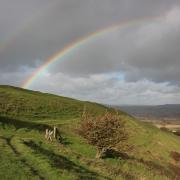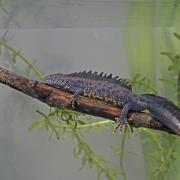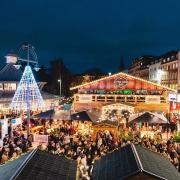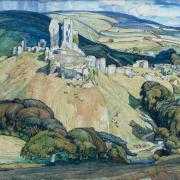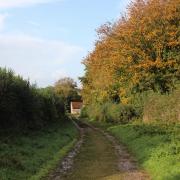The first two lines of Dragonfly, by celebrated children’s poet Eleanor Farjeon, brings back happy memories of the long, lazy summer days of my childhood.
When the heat of the summer
Made drowsy the land,
A dragonfly came
And sat on my hand.
With its blue jointed body,
And wings like spun glass,
It lit on my fingers
As though they were grass.
Now, as an adult, when I close my eyes and feel the warmth of the sun on my face, inhale the scent of wildflowers and listen to nature’s gentle sounds, I’m transported back to those idyllic school holidays. Nature offered infinite opportunities for exploration and fun. Little did I know that through my childhood play I was learning about our wonderful natural world, my place within it, and most importantly, how to look after it.

In 2015, the RSPB commissioned a study by the University of Derby’s Nature Connectedness Research Group. The Impact of Children’s Connection to Nature, led by Dr Miles Richardson, explored the association between a child’s connection to nature and the specific benefits of educational attainment, health and wellbeing, pro-environmental behaviour, and pro-nature behaviours. One of the conclusions was that a connection with nature offers positive wellbeing effects for both children and adults. The research also revealed that if children are encouraged to explore a natural environment, learn how to appreciate and respect nature whilst also having fun, they develop a strong connection with it. And children who feel this connection to nature are likely to develop an empathy for it as well as a life-long desire to look after the natural environment.
Playing and learning in a natural environment has huge benefits for children of all ages, as the RSPB’s Morwenna Alldis discovered when she and her 4-year-old son Bran recently did a mini-beast safari. ‘We were kneeling in a patch of long grass, and I pointed out a ladybird balanced on the tip of a stem to Bran. The moment he recognised the red with black spots, I watched wonderment ripple up through every muscle in his face. It was utterly beautiful to observe. He was beaming and so was I, rediscovering awe for a simple ladybird through Bran’s young eyes.’

If you want to experience this sense of awe with your children or grandchildren, then our Dorset reserves are a great place to do it. At both RSPB Arne and RSPB Radipole Lake Discovery Centre you can hire bug backpacks (for children and adults!). They contain nature guides to help with identification, a bug collecting pot, magnifying glass, and binoculars. Children can enjoy discovering the hundreds of mini beasts that call the reserve home. From the weird and the wonderful Norfolk hawker dragonflies to everyday insects such as spiders, slugs, butterflies and ladybirds.
Such simple discoveries can leave a lasting positive impression. I fondly remember the mini beast safaris of my childhood. The excitement of turning over logs and leaves to see what was living under there, then scanning the skies for winged wildlife.
Encourage children to explore sensitively and with care – remind them to place things back where they came from and, most importantly, to be gentle when meeting mini beast. We are giants compared to them and we don’t want to cause harm.

The RSPB have lots of excitement inducing events this summer to help families connect to Dorset’s amazing nature, including a special opportunity to camp out at RSPB Arne with our Big Wild Sleepouts. It’s a wonderful opportunity to make some awesome memories together. Pitch your tents then wander around the reserve or join one of the many guided activities on offer such as learning how to sweep net long grass to discover the crickets and grasshoppers that live there. After supper, enjoy a nighttime guided walk to listen to the strange sounds of the creatures that come out after sundown. Then wake up to the beauty of a summer sunrise over Poole Harbour - an experience that no family will ever forget.
For parents with little one’s under 12 months we run a monthly Parent and Baby Walk – the routes are gentle with lots of stops. Our monthly Preschool Nature Club is perfect for children aged between 2 ½ and 5 years old. Each month has a different theme and June’s is a Summer Scavenger Hunt. And, on May 31 we have a Family Nightjar Walk giving families the exclusive opportunity to listen for the iconic ‘churring’ bird that comes out at night.
For all our events, visit: events.rspb.org.uk/arne
Connecting Schools with Nature
We offer free, guided school visits at RSPB Arne, RSPB Radipole in Weymouth, RSPB Garston Wood near Sixpenny Handley, and at a partner site, Holten Heath near Poole. Bring the classroom outside where children of all ages can learn about a range of curriculum-based topics as they enjoy exploration and play in a stunning natural environment. These school visits are free, all the school needs to do is arrange transport. Teachers can email arne@rspb.org.uk to find out more and make a booking.






